|
|
|
Sort Order |
|
|
|
Items / Page
|
|
|
|
|
|
|
| Srl | Item |
| 1 |
ID:
087392
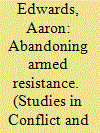

|
|
|
|
|
| Publication |
2009.
|
| Summary/Abstract |
This article explores the Ulster Volunteer Force's (UVF) decision in May 2007 to abandon its campaign of "armed resistance" and pursue "a non-military, civilianized, role" in Northern Ireland. It does so by analyzing the UVF's actions in light of the academic literature on strategic terrorism. The central argument advanced in the article is that the UVF's decision to put its weapons "beyond reach" and re-structure its organization along civilian lines is (a) internally consistent with its stated policy of countering "violent nationalism," (b) symptomatic of the transformation in the sociopolitical context since the 1994 paramilitary cease-fires, and (c) the logical outworking of the group's lack of popular legitimacy among its core Protestant working-class support-base. The article concludes with an assessment of the risks and possible dividends that the end of UVF terrorism holds for the Northern Ireland peace process.
|
|
|
|
|
|
|
|
|
|
|
|
|
|
|
|
| 2 |
ID:
123261
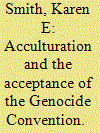

|
|
|
|
|
| Publication |
2013.
|
| Summary/Abstract |
This article contributes to the burgeoning literature on why states ratify human rights treaties. It first analyses why Ireland, the United Kingdom and the United States did not initially ratify or accede to the 1948 Genocide Convention, and then explores why the three countries eventually did accept it, 20-40 years after it was approved by the United Nations General Assembly. The extent to which material costs and benefits, the logic of appropriateness, and acculturation played a role in each of the three cases is assessed. Acculturation is particularly evident in the Irish case, but it also helps to explain the UK and US acceptance of the Convention.
|
|
|
|
|
|
|
|
|
|
|
|
|
|
|
|
| 3 |
ID:
111026
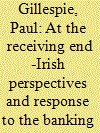

|
|
|
|
|
| Publication |
2012.
|
| Summary/Abstract |
Having enjoyed nearly two decades of economic recovery and rapid development as one of the most successful member-states of the European Union, Ireland was shocked and chastened by the global financial crisis of 2007-2008 and its traumatic impact on the country. A threefold crisis assailed its economic and political elites and citizens when the property bubble built up since 2002 exploded 6 years later. Its banking system collapsed through over-exposure to loans built up from the cheap credit made available after the euro was introduced. There was an immediate impact on state revenues when property-related windfall taxes collapsed under this pressure, exposing a yawning gap between current expenditure and revenues. And the country's economic competitiveness suffered from a runaway cost base. The paper puts these events in the context of Ireland's overall experience of European integration and its economic development. It goes on to explain how Ireland got into trouble in 2008 and tracks the major events over the next 3 years and how they were handled. Three major axes of argument about the EU/IMF rescue packages are discussed, highlighting the views of political leaders and public opinion dealing with the intensified euro zone crisis in autumn 2011. The paper goes on to assess their attitudes to EU decision-making, the role of the European Central Bank, the prospects of treaty change and Ireland's emerging position in a reconfigured Europe coming to terms with a more multi-polar world.
|
|
|
|
|
|
|
|
|
|
|
|
|
|
|
|
| 4 |
ID:
044585
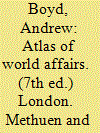

|
|
|
|
|
| Edition |
7th ed.
|
| Publication |
London, Methuen and co. ltd., 1983.
|
| Description |
208p.Pbk
|
| Standard Number |
0416323804
|
|
|
|
|
|
|
|
|
|
|
|
Copies: C:1/I:0,R:0,Q:0
Circulation
| Accession# | Call# | Current Location | Status | Policy | Location |
| 024677 | 911/BOY 024677 | Main | On Shelf | General | |
|
|
|
|
| 5 |
ID:
112073
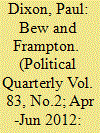

|
|
|
| 6 |
ID:
105189
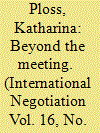

|
|
|
|
|
| Publication |
2011.
|
| Summary/Abstract |
Intercommunity dialogue encounters are a crucial tool for constructive conflict resolution. This research examines grassroots dialogue encounters with regard to the societal position of the participants, as well the situation `on the ground' as influential to the transfer process. Interviews in Northern Ireland and Kosovo with community activists stressed the effectiveness of personal characteristics of dialogue participants when it came to transfer. Moreover, the readiness - affected by socio-economic conditions as well as external/secondary conflict parties - of the peer group to listen to its participant seemed fundamental.
|
|
|
|
|
|
|
|
|
|
|
|
|
|
|
|
| 7 |
ID:
087351
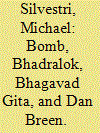

|
|
|
|
|
| Publication |
2009.
|
| Summary/Abstract |
This article will analyze several issues relating to terrorism in colonial India, focusing on the province of Bengal from the early 1900s to the mid-1930s. First, I will analyze the composition of Bengali revolutionary organizations. Although Bengali revolutionary terrorism was not a mass movement, I argue that there was greater diversity in the movement's social and religious composition, and in the outlook of its members, than is often assumed. Second, I will examine the question of indigenous versus foreign influences on Indian terrorism. Terrorism in Bengal and elsewhere in colonial India was diverse in its inspirations, drawing upon indigenous resistance to colonial rule, and Hindu religious imagery, as well as European anarchist, nationalist, and socialist movements. Lastly, I will consider some of the ways in which the revolutionary movement changed over its thirty-year history and conclude with a brief discussion of the colonial response to Bengali terrorism. Bengali terrorists' adaptation and re-fashioning of ideas and tactics in a colonial context illustrate the widespread networks of exchange within the British Empire.
|
|
|
|
|
|
|
|
|
|
|
|
|
|
|
|
| 8 |
ID:
127707
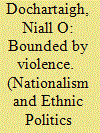

|
|
|
|
|
| Publication |
2013.
|
| Summary/Abstract |
This article analyzes the relationship between territoriality and organized violence through an examination of two relatively understudied aspects of the production and reproduction of informal territorial boundaries in situations of violent conflict. It looks first at the role of the state in the establishment, maintenance, and institutionalization of substate territories associated with challengers, outlining how these bounding processes are generated through interaction between the state and challengers, rather than primarily through the actions of challengers. Secondly, it explores the shaping force of geopolitical contexts on the everyday maintenance of informal boundaries in conflict situations. The argument is illustrated with examples from the most recent period of violent conflict in the north of Ireland, drawing on a range of primary sources, including official and private papers. The article argues that an analysis that gives due recognition to the central role of the state and the importance of the geopolitical context in the delineation and institutionalization of substate territories associated with armed challengers can help us to better understand the dynamics of organized violence.
|
|
|
|
|
|
|
|
|
|
|
|
|
|
|
|
| 9 |
ID:
156329
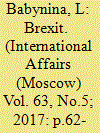

|
|
|
|
|
| Summary/Abstract |
IN JUNE 2016, Eurosceptics won the referendum on the UK's membership in the European Union. In March 2017, UK Prime Minister Theresa May notified Donald Tusk, President of the European Council, that Great Britain intended to leave the EU; this triggered Article 50 of the Lisbon Treaty. The British government needed nine months to formulate its vision of the future relations with the EU and outline the parameters of withdrawal. British proposals, however, multiplied questions rather than provided answers. The EU leaders, on the other hand, have their own ideas about the conditions, on which the UK will be allowed to quit. The sides' initial positions differ to the extent that the road toward a compromise looks difficult, not to say tortuous.
|
|
|
|
|
|
|
|
|
|
|
|
|
|
|
|
| 10 |
ID:
160465
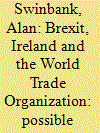

|
|
|
|
|
| Summary/Abstract |
Prior to the UK’s accession to the then European Economic Community in 1973, Australia was a significant supplier of Britain’s food. Membership of the European Union (EU) resulted in trade diversion, closing the British market to Australian sugar, for example. This article questions whether the UK’s exit from the EU (‘Brexit’) might usher in a new agri-food trade regime, restoring Australian farmers’ access to the British market, or whether other opposing political economy considerations might prevail. Would the UK unilaterally adopt free trade? Can a comprehensive free trade area agreement between Australia and the UK, including agri-food products, be negotiated? Any new relationship will need to reflect the UK government’s stated preference for a frictionless border with EU 27 (particularly on the island of Ireland), the World Trade Organization’s rule book, and the interests of the UK’s farm lobbies, as well as the UK’s quest for ‘free trade’ with the wider international community.
|
|
|
|
|
|
|
|
|
|
|
|
|
|
|
|
| 11 |
ID:
034689
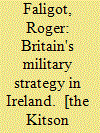

|
|
|
|
|
| Publication |
London, Zed Press, 1983.
|
| Description |
249p.Pbk
|
| Standard Number |
0862320496
|
|
|
|
|
|
|
|
|
|
|
|
Copies: C:1/I:0,R:0,Q:0
Circulation
| Accession# | Call# | Current Location | Status | Policy | Location |
| 022859 | 941.60824/FAL 022859 | Main | On Shelf | General | |
|
|
|
|
| 12 |
ID:
164183
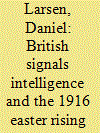

|
|
|
|
|
| Summary/Abstract |
Historians for decades have placed Room 40, the First World War British naval signals intelligence organization, at the centre of narratives about the British anticipation of and response to the Easter Rising in Ireland in 1916. A series of crucial decrypts of telegrams between the German embassy in Washington and Berlin, it has been believed, provided significant advance intelligence about the Rising before it took place. This article upends previous accounts by demonstrating that Room 40 possessed far less advance knowledge about the Rising than has been believed, with most of the supposedly key decrypts not being generated until months after the Rising had taken place.
|
|
|
|
|
|
|
|
|
|
|
|
|
|
|
|
| 13 |
ID:
109433
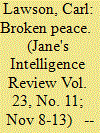

|
|
|
| 14 |
ID:
108683
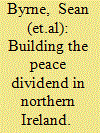

|
|
|
|
|
| Publication |
2009.
|
| Summary/Abstract |
The role of the International Fund for Ireland and the European Union Peace II Fund is examined through the perspectives of a public opinion poll of 1,023 of Northern Ireland's citizens, and interviews with 98 community groups, civil servants, and development officers. This article explains that while some of the respondents are optimistic about their life changes others are concerned that the conflict could reignite in the future. In particular, the respondent's images indicate the importance of the self-society relationship and the necessity of tailoring economic assistance to the distinctive socioeconomic needs of the targeted communities, and how third parties must include local perspectives in their efforts to build the peace.
|
|
|
|
|
|
|
|
|
|
|
|
|
|
|
|
| 15 |
ID:
039100
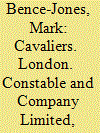

|
|
|
|
|
| Publication |
London, Constable and Company Limited, 1976.
|
| Description |
xi, 206p.: ill.Hbk
|
| Standard Number |
0094612609
|
|
|
|
|
|
|
|
|
|
|
|
Copies: C:1/I:0,R:0,Q:0
Circulation
| Accession# | Call# | Current Location | Status | Policy | Location |
| 027198 | 941.06/BEN 027198 | Main | On Shelf | General | |
|
|
|
|
| 16 |
ID:
033136
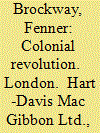

|
|
|
|
|
| Publication |
London, Hart-Davis Mac Gibbon Ltd., 1973.
|
| Description |
654p.Hbk
|
| Standard Number |
0246106050
|
|
|
|
|
|
|
|
|
|
|
|
Copies: C:1/I:0,R:0,Q:0
Circulation
| Accession# | Call# | Current Location | Status | Policy | Location |
| 012857 | 909.8/BRO 012857 | Main | On Shelf | General | |
|
|
|
|
| 17 |
ID:
120012
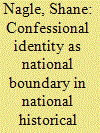

|
|
|
|
|
| Publication |
2013.
|
| Summary/Abstract |
This article explores the question of 'boundary-formation' by examining the significance of historical narratives for defining the nation. Specifically, it compares the historical construction of religious or confessional identity as national boundary in the cases of Ireland and Germany in the nineteenth and early twentieth centuries. The article examines the importance of this historically constructed national identity for rendering continuity to the nation's history and delineating the national 'Other', thereby establishing national particularity. The historical 'joining' of 'Irishness' to Catholic identity and 'Germanness' to Protestant identity, as well as providing cultural 'cement' for the nation, also had exclusionary implications.
|
|
|
|
|
|
|
|
|
|
|
|
|
|
|
|
| 18 |
ID:
193036
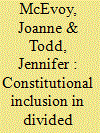

|
|
|
|
|
| Summary/Abstract |
Processes of constitutional discussion increasingly invite widespread popular inclusion and participation. Conceptual and practical problems remain, not least the respects in which inclusion is to take place. In deeply divided places, these challenges are intensified, first in the difficulties of conceptualising inclusion, and second in the practical dangers participation may pose to peace. We tackle these problems empirically by looking at a hard case of constitutional discussion amid division: the re-emergence of debate about Irish unity in Northern Ireland and the Republic of Ireland. Through focus groups and interviews, we explore how ‘others’, disengaged from the main political groups and defined transversally, approach the discussion, showing that they welcome the prospect of participation and seek to remove discursive triggers of conflict by focussing on shared everyday experience. We discuss the implications for the constitutional process and the likely impact on polarisation. The analysis has implications for the literature on divided societies, for constitutional theory and for policy. We argue that it is both possible and desirable to remedy group exclusion while facilitating universalistic discussion and lessening the dangers of polarisation. The policy implications are quite radical.
|
|
|
|
|
|
|
|
|
|
|
|
|
|
|
|
| 19 |
ID:
095086
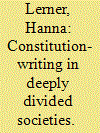

|
|
|
|
|
| Publication |
2010.
|
| Summary/Abstract |
The article addresses the puzzle of how societies still grappling over the common values and shared vision of their state draft a democratic constitution. It argues that an incrementalist approach to constitution-making enabled such deeply divided societies to enact either a written constitution or function with a material constitution by deferring controversial choices regarding the foundational aspects of the polity to future political institutions. It demonstrates how various types of incrementalist constitutional strategies - such as avoidance of clear decisions, the use of ambivalent and vague legal language, or the inclusion of contrasting provisions in the constitution - were deployed in the constitutional drafting of three deeply divided societies: India, Ireland and Israel. By importing the existing ideational conflicts into their constitutions, and by deviating from the common perception of constitution-making as a revolutionary moment, the framers in these three cases enabled their constitutions to reflect the divided identity of 'the people'.
|
|
|
|
|
|
|
|
|
|
|
|
|
|
|
|
| 20 |
ID:
112897
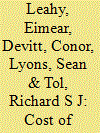

|
|
|
|
|
| Publication |
2012.
|
| Summary/Abstract |
This paper investigates the economic implications of disruptions of one to ninety days to the supply of natural gas in Ireland. We assess the impact of a hypothetical gas supply disruption in both winter and summer in 2008 (with observed market characteristics) and in 2020 (with projected market characteristics). The cost of a natural gas outage includes the cost of natural gas being unavailable for heating and other purposes in the industrial and commercial sectors, lost consumer surplus in the residential sector, the cost of lost electricity in all sectors and lost VAT on the sale of gas and electricity. Ireland generates much of its electricity from natural gas and the loss of this electricity accounts for the majority of the cost of a natural gas outage. Losing gas-fired electricity would cost 0.1-1.0 billion euro per day, depending on the time to the week, the time of year and rationing. Industry should be rationed before households to minimise economic losses, but current emergency protocols do the opposite. If gas-fired electricity is unavailable for three months, the economic loss could be up to 80 billion euro, about half of Gross Domestic Product. Losing gas for heating too would add up to approximately 8 billion euro in economic losses. We also discuss some options to increase Ireland's security of supply, and find that the cost is a small fraction of the avoided maximum damage.
|
|
|
|
|
|
|
|
|
|
|
|
|
|
|
|
|
|
|
|
|